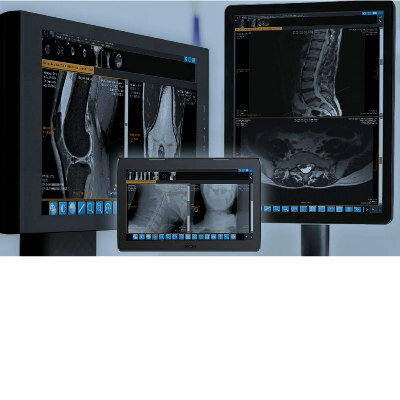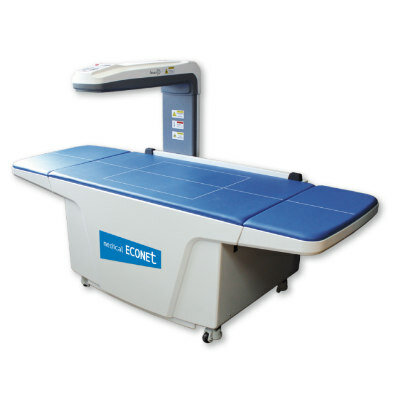Powerful MRI Makes Challenging Exams Simpler
|
By MedImaging International staff writers Posted on 30 Dec 2021 |

Image: The SIGNA Hero honors all healthcare workers (Photo courtesy of GE Healthcare)
A new 3T MRI offers better image quality, enhanced workflows, increased productivity, improved patient comfort, and greater sustainability.
The GE Healthcare (GE; Chicago, IL, USA) SIGNA Hero, named in honor of all healthcare workers facing the COVID-19 pandemic, is designed to help accommodate more patients of all shapes and sizes, with a 70 cm bore and detachable table for enhanced patient comfort. The system also leverages artificial intelligence (AI) technologies, such as AIR Recon DL, a deep learning image reconstruction algorithm that works across all anatomies and reduces exam times by 30-50%, to under 15 minutes.
Combined with GE Healthcare’s patented AIR Coils, clinicians have total freedom in coil positioning and handling during an MRI scan. Each coil is lightweight and flexible, so as to closely wrap around patients, like a blanket, snugly fitting their form. AIR Touch automates coil selection and landmarking reducing set up time by up to 37%; AIR x provides automated slice prescriptions, helping to reduce previously redundant, manual steps; and an automated workflow tool for brain and knee scanning helps increase consistency and productivity for greater operational efficiency.
“True heroes are built for any challenge, and today’s healthcare workers have proven themselves true heroes,” said Jie Xue, president and CEO of MRI at GE Healthcare. “While the world’s healthcare heroes cared for patients on the frontlines, our GE Healthcare team kept working the background on cutting-edge technologies to help reduce the burden on clinicians and improve outcomes. The result is SIGNA Hero, a system dedicated to all those who always care for our global community.”
SIGNA Hero is also an eco-friendly system, designed to be capable of lowering helium usage by up to 67% percent via Intelligent Magnet Technology (IMT). The SIGNA Hero magnet is also designed, produced, and shipped from a facility that is 100% carbon neutral.
Related Links:
GE Healthcare
The GE Healthcare (GE; Chicago, IL, USA) SIGNA Hero, named in honor of all healthcare workers facing the COVID-19 pandemic, is designed to help accommodate more patients of all shapes and sizes, with a 70 cm bore and detachable table for enhanced patient comfort. The system also leverages artificial intelligence (AI) technologies, such as AIR Recon DL, a deep learning image reconstruction algorithm that works across all anatomies and reduces exam times by 30-50%, to under 15 minutes.
Combined with GE Healthcare’s patented AIR Coils, clinicians have total freedom in coil positioning and handling during an MRI scan. Each coil is lightweight and flexible, so as to closely wrap around patients, like a blanket, snugly fitting their form. AIR Touch automates coil selection and landmarking reducing set up time by up to 37%; AIR x provides automated slice prescriptions, helping to reduce previously redundant, manual steps; and an automated workflow tool for brain and knee scanning helps increase consistency and productivity for greater operational efficiency.
“True heroes are built for any challenge, and today’s healthcare workers have proven themselves true heroes,” said Jie Xue, president and CEO of MRI at GE Healthcare. “While the world’s healthcare heroes cared for patients on the frontlines, our GE Healthcare team kept working the background on cutting-edge technologies to help reduce the burden on clinicians and improve outcomes. The result is SIGNA Hero, a system dedicated to all those who always care for our global community.”
SIGNA Hero is also an eco-friendly system, designed to be capable of lowering helium usage by up to 67% percent via Intelligent Magnet Technology (IMT). The SIGNA Hero magnet is also designed, produced, and shipped from a facility that is 100% carbon neutral.
Related Links:
GE Healthcare
Latest MRI News
- PET/MRI Improves Diagnostic Accuracy for Prostate Cancer Patients
- Next Generation MR-Guided Focused Ultrasound Ushers In Future of Incisionless Neurosurgery
- Two-Part MRI Scan Detects Prostate Cancer More Quickly without Compromising Diagnostic Quality
- World’s Most Powerful MRI Machine Images Living Brain with Unrivaled Clarity
- New Whole-Body Imaging Technology Makes It Possible to View Inflammation on MRI Scan
- Combining Prostate MRI with Blood Test Can Avoid Unnecessary Prostate Biopsies
- New Treatment Combines MRI and Ultrasound to Control Prostate Cancer without Serious Side Effects
- MRI Improves Diagnosis and Treatment of Prostate Cancer
- Combined PET-MRI Scan Improves Treatment for Early Breast Cancer Patients
- 4D MRI Could Improve Clinical Assessment of Heart Blood Flow Abnormalities
- MRI-Guided Focused Ultrasound Therapy Shows Promise in Treating Prostate Cancer
- AI-Based MRI Tool Outperforms Current Brain Tumor Diagnosis Methods
- DW-MRI Lights up Small Ovarian Lesions like Light Bulbs
- Abbreviated Breast MRI Effective for High-Risk Screening without Compromising Diagnostic Accuracy
- New MRI Method Detects Alzheimer’s Earlier in People without Clinical Signs
- MRI Monitoring Reduces Mortality in Women at High Risk of BRCA1 Breast Cancer
Channels
Radiography
view channel
Novel Breast Imaging System Proves As Effective As Mammography
Breast cancer remains the most frequently diagnosed cancer among women. It is projected that one in eight women will be diagnosed with breast cancer during her lifetime, and one in 42 women who turn 50... Read more
AI Assistance Improves Breast-Cancer Screening by Reducing False Positives
Radiologists typically detect one case of cancer for every 200 mammograms reviewed. However, these evaluations often result in false positives, leading to unnecessary patient recalls for additional testing,... Read moreUltrasound
view channel
Deep Learning Advances Super-Resolution Ultrasound Imaging
Ultrasound localization microscopy (ULM) is an advanced imaging technique that offers high-resolution visualization of microvascular structures. It employs microbubbles, FDA-approved contrast agents, injected... Read more
Novel Ultrasound-Launched Targeted Nanoparticle Eliminates Biofilm and Bacterial Infection
Biofilms, formed by bacteria aggregating into dense communities for protection against harsh environmental conditions, are a significant contributor to various infectious diseases. Biofilms frequently... Read moreNuclear Medicine
view channel
New SPECT/CT Technique Could Change Imaging Practices and Increase Patient Access
The development of lead-212 (212Pb)-PSMA–based targeted alpha therapy (TAT) is garnering significant interest in treating patients with metastatic castration-resistant prostate cancer. The imaging of 212Pb,... Read moreNew Radiotheranostic System Detects and Treats Ovarian Cancer Noninvasively
Ovarian cancer is the most lethal gynecological cancer, with less than a 30% five-year survival rate for those diagnosed in late stages. Despite surgery and platinum-based chemotherapy being the standard... Read more
AI System Automatically and Reliably Detects Cardiac Amyloidosis Using Scintigraphy Imaging
Cardiac amyloidosis, a condition characterized by the buildup of abnormal protein deposits (amyloids) in the heart muscle, severely affects heart function and can lead to heart failure or death without... Read moreGeneral/Advanced Imaging
view channel
New AI Method Captures Uncertainty in Medical Images
In the field of biomedicine, segmentation is the process of annotating pixels from an important structure in medical images, such as organs or cells. Artificial Intelligence (AI) models are utilized to... Read more.jpg)
CT Coronary Angiography Reduces Need for Invasive Tests to Diagnose Coronary Artery Disease
Coronary artery disease (CAD), one of the leading causes of death worldwide, involves the narrowing of coronary arteries due to atherosclerosis, resulting in insufficient blood flow to the heart muscle.... Read more
Novel Blood Test Could Reduce Need for PET Imaging of Patients with Alzheimer’s
Alzheimer's disease (AD), a condition marked by cognitive decline and the presence of beta-amyloid (Aβ) plaques and neurofibrillary tangles in the brain, poses diagnostic challenges. Amyloid positron emission... Read more.jpg)
CT-Based Deep Learning Algorithm Accurately Differentiates Benign From Malignant Vertebral Fractures
The rise in the aging population is expected to result in a corresponding increase in the prevalence of vertebral fractures which can cause back pain or neurologic compromise, leading to impaired function... Read moreImaging IT
view channel
New Google Cloud Medical Imaging Suite Makes Imaging Healthcare Data More Accessible
Medical imaging is a critical tool used to diagnose patients, and there are billions of medical images scanned globally each year. Imaging data accounts for about 90% of all healthcare data1 and, until... Read more
Global AI in Medical Diagnostics Market to Be Driven by Demand for Image Recognition in Radiology
The global artificial intelligence (AI) in medical diagnostics market is expanding with early disease detection being one of its key applications and image recognition becoming a compelling consumer proposition... Read moreIndustry News
view channel
Bayer and Google Partner on New AI Product for Radiologists
Medical imaging data comprises around 90% of all healthcare data, and it is a highly complex and rich clinical data modality and serves as a vital tool for diagnosing patients. Each year, billions of medical... Read more




















